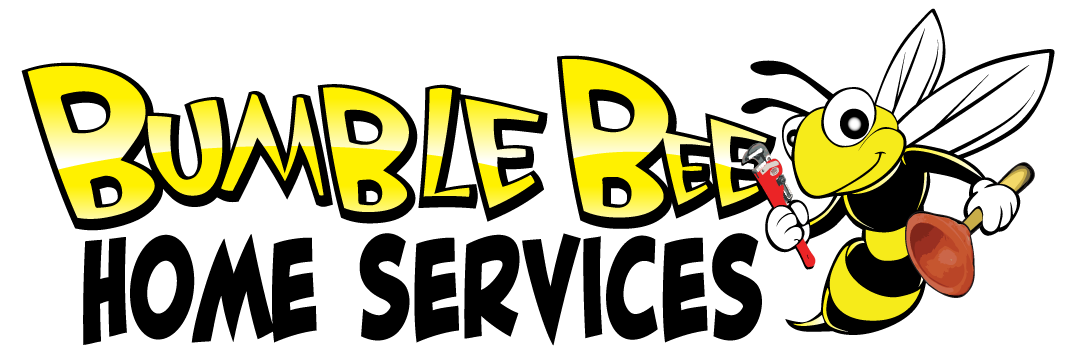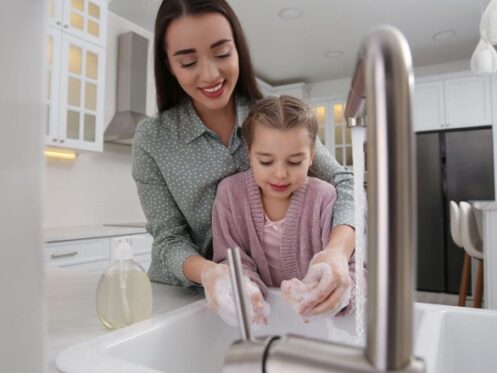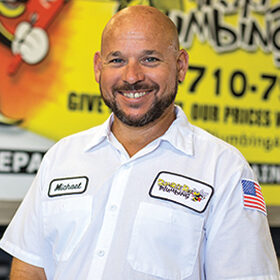Having your kitchen sink or garbage disposal suddenly clog up can be a major headache. Almost all clogs are caused by simply putting things down the drain that should really go into the trash. To prevent them from clogging, you should always be careful about what you try to wash down the sink or put into your garbage disposal. A garbage disposal can be especially prone to clogging because many people try to put too much into the unit at once or don’t know how to use it properly. This article will explain what things you should never put down your kitchen sink or into your disposal and also what to do when dealing with a clog.
Fat, Oil, or Grease
Even if you have a garbage disposal, some of the absolute worst things you can put down a kitchen sink are all types of fat, oil, or grease. One of the most common causes of drain and sewer issues is a so-called FOG (fat, oil, and grease clog). No matter how much hot water you use to try to flush fat, oil, or grease down the drain, some of it will end up getting stuck inside the drain pipe or main sewer line. This forms a sticky coating that can then trap food scraps or any other solid materials that go down a drain or get flushed down the toilet. Fat, oil, and grease also create major issues for municipal sewer systems and can lead to massive “fatbergs” forming that consist of fats, toilet paper, and other solid waste.
Some grease or oil will always end up going down the drain when you’re rinsing off dishes, pots, and pans. Nonetheless, you should make sure to wipe off anything that is overly greasy before rinsing and make sure to never pour grease or oil down the drain directly, even if you have a garbage disposal. The fact that small amounts will still end up in the drain is also the main reason why you should always run cold water when using your garbage disposal. Cold water will keep any fats solid so that the disposal will easily pulverize them and allow them to be washed down the drain. If you use hot water, any fat will melt and get stuck to the inside of the disposal. This can not only lead to it starting to clog, but it will also contribute to the disposal and drain smelling unpleasant.
Coffee Grounds
Some people put coffee grounds down their kitchen sink without thinking twice about it. The issue is that wet coffee grounds are so dense and clumpy they will often get stuck in the P-trap under the drain and potentially contribute to it starting to clog up. A similar issue will occur eventually if you flush cat litter down the toilet.
Eggshells
One question we get quite often is whether you can put eggshells in a garbage disposal. While eggshells are fragile enough that they can easily be ground up by a garbage disposal, you should still always toss them in the trash instead. The reason is due to the slimy membrane on the inside of the shell. This membrane can easily get stuck in the small holes on the plate or flywheel and clog up the garbage disposal so that it no longer drains. The membrane can also be extremely difficult to get rid of once it dries and essentially becomes glued to the plate. This same issue is also why you should never put onion peels in a garbage disposal since the inside of the peel has a similar slimy membrane.
Grains, Nuts, and Starchy Foods
Any type of grains or starchy foods should also never go down the kitchen sink or into a garbage disposal. This includes rice, pasta, any type of bean, potatoes and potato peels, etc. Even though a garbage disposal can pulverize these items, all it will do is create a thick, sticky mass that is highly likely to clog up the disposal and drain.
Putting peanuts or any other type of nuts into a garbage disposal can be an even bigger problem. In this situation, the garbage disposal will essentially grind them into peanut butter that is almost impossible to wash away. Instead, you’ll end up with a sticky coating inside the disposal. It will start capturing other food scraps and often lead to the disposal completely clogging up.
Fibrous Fruits and Vegetables
You should also make sure to never dispose of any type of more fibrous fruit or vegetable through your garbage disposal. That includes banana peels, celery, squash, etc. The issue here is that the fibers can easily get wrapped around the impellers or the spinning plate and lead to the garbage disposal jamming up. This creates an extremely high risk of the unit’s motor burning out if you continue trying to run the disposal for more than even a few seconds when it’s jammed.
If the disposal jams, you’ll then need to unjam it by using the hex key or Allen wrench that came with the unit. This is done by inserting the wrench into the slot on the underside of the disposal and turning it one full rotation in one direction and then one full rotation in the other. Turning the wrench manually spins the plate and will hopefully free it up and unjam the mechanism. Unfortunately, this process usually works much better if there is some hard item jamming the device, and it may not be effective if the unit is jammed by fruit or vegetable fibers.
Bones and Other Hard Items
One thing we’ve heard many times is that you should occasionally run bones or other similar hard items through a garbage disposal. The thinking behind this is that hard items help to sharpen the unit’s blades to allow it to work better. This is absolutely not true since garbage disposals don’t have blades. Instead, they have impellers on the spinning plate that produces centrifugal force, which pushes the food scraps against a stationary grinding ring.
Bones, nut shells, and other hard items are some of the worst things you can put into a garbage disposal. The reason is that they can easily get trapped between one of the impellers and the grinding ring, immediately causing the disposal to jam. Even if it does finally grind up the bones or whatever, they will usually get stuck in the P-trap since they are too heavy to easily get washed down.
How to Overcome a Clogged Sink or Garbage Disposal
When dealing with a clog, most people immediately reach for a bottle of drain cleaner. While drain cleaner is effective, virtually every plumber will tell you never to use it. The reason is that the harsh chemicals can do quite severe damage to PVC drain pipes and will often lead to the pipe leaking. The best way to deal with a clog is to use a sink plunger, and if this doesn’t work, contact a plumber to have your drain cleaned.
Bumble Bee Home Services is a locally operated company that has been serving the Glendale, AZ area since 2011. We specialize in drain cleaning and all other drain and sewer services, and we can also handle all of your water heater and plumbing repair and installation needs. If you’re dealing with a clogged drain or you need any other plumbing service, contact us today.



